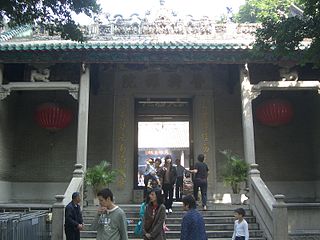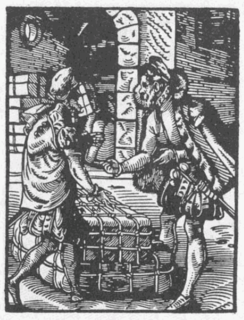
A customs union is generally defined as a type of trade bloc which is composed of a free trade area with a common external tariff. Customs unions are established through trade pacts where the participant countries set up common external trade policy. Common competition policy is also helpful to avoid competition deficiency.

On March 31, 1854, the Convention of Kanagawa or Kanagawa Treaty was the first treaty between the United States and the Tokugawa shogunate.

The Office of the United States Trade Representative (USTR) is the United States government agency responsible for developing and recommending United States trade policy to the President of the United States, conducting trade negotiations at bilateral and multilateral levels, and coordinating trade policy within the government through the interagency Trade Policy Staff Committee (TPSC) and Trade Policy Review Group (TPRG).
A Committee of the States was an arm of the United States government, under the Articles of Confederation. The Committee consisted of one member from each state, and carried out the functions of government while the Congress of the Confederation was in recess.

The United Nations Convention on Contracts for the International Sale of Goods is a treaty that codifies uniform international sales law. It has been ratified by 91 states, which account for a significant proportion of world trade, making it one of the most successful international uniform laws. Liechtenstein was the most recent state to adopt the Convention, having acceded to it on 30 April 2019.

The Treaty of Wanghia was a diplomatic agreement between Qing dynasty of China and United States, signed on July 3, 1844 in the Kun Iam Temple. Its official title name is the Treaty of peace, amity, and commerce, between the United States of America and the Chinese Empire. Following passage by the U.S. Congress, it was ratified by President John Tyler on January 17, 1845. It formally remained in effect until the 1943 Sino-American Treaty for the Relinquishment of Extraterritorial Rights in China.
The Eastland Company, or North Sea Company, was an English crown-chartered company, founded in 1579 to foster trade with Scandinavia and Baltic Sea states. Like the better-known Russia Company, this was an attempt by the English to challenge the Hanseatic League's dominance in the commerce of northern and central Europe.

The Trade Act of 1974 was passed to help industry in the United States become more competitive or phase workers into other industries or occupations.
Section 301 of the U.S. Trade Act of 1974, authorizes the President to take all appropriate action, including retaliation, to obtain the removal of any act, policy, or practice of a foreign government that violates an international trade agreement or is unjustified, unreasonable, or discriminatory, and that burdens or restricts U.S. commerce. Section 301 cases can be self-initiated by the United States Trade Representative (USTR) or as the result of a petition filed by a firm or industry group. If USTR initiates a Section 301 investigation, it must seek to negotiate a settlement with the foreign country in the form of compensation or elimination of the trade barrier. For cases involving trade agreements, the USTR is required to request formal dispute proceedings as provided by the trade agreements. The law does not require that the U.S. government wait until it receives authorization from the World Trade Organization (WTO) to take enforcement actions, and the President is increasingly focused on enforcing intellectual property (IP) rights under the "Special" 301 amendments but the U.S. has committed itself to pursuing the resolution of disputes under WTO agreements through the WTO dispute settlement mechanism, which has its own timetable.

The Treaty of Amity and Commerce Between the United States and France, was the first of two treaties between the United States and France, signed on February 6, 1778, at the Hôtel de Coislin in Paris. Its sister treaty, the Treaty of Alliance were signed immediately thereafter. The Treaty of Amity and Commerce recognized the de facto independence of the United States and established a strictly commercial treaty between the two nations as an alternative to, and in direct defiance of, the British Acts of Trade and Navigation; the Treaty of Alliance, for mutual defense, was then signed "particularly in case Great Britain in Resentment of that connection and of the good correspondence which is the object of the [first] Treaty, should break the Peace with France, either by direct hostilities, or by hindering her commerce and navigation, in a manner contrary to the Rights of Nations, and the Peace subsisting between the two Crowns". These were the first treaties ever negotiated by the fledgling United States and signed in the midst of the American Revolutionary War. Due to later complications with the alliance treaty, America would not sign another military alliance until the Declaration by United Nations in 1942.

The Wildlife Protection Act, 1972 is an Act of the Parliament of India enacted for protection of plants and animal species. Before 1972, India had only five designated national parks. Among other reforms, the Act established schedules of protected plant and animal species; hunting or harvesting these species was largely outlawed. The Act provides for the protection of wild animals, birds and plants; and for matters connected there with or ancillary or incidental thereto. It extends to the whole of India, except the State of Jammu and Kashmir which has its own wildlife act. It has six schedules which give varying degrees of protection. Schedule I and part II of Schedule II provide absolute protection - offences under these are prescribed the highest penalties. Species listed in Schedule III and Schedule IV are also protected, but the penalties are much lower. Schedule V includes the animals which may be hunted. The specified endemic plants in Schedule VI are prohibited from cultivation and planting. The hunting to the Enforcement authorities have the power to compound offences under this Schedule. Up to April 2010 there have been 16 convictions under this act relating to the death of tigers.
The United States Munitions List (USML) is a list of articles, services, and related technology designated as defense and space-related by the United States federal government. This designation is pursuant to sections 38 and 47(7) of the Arms Export Control Act. These articles fall under the export and temporary import jurisdiction of the Department of State.
The Commerce Department trade mission controversy was an American political controversy in the 1990s during the Clinton Administration. It refers to the alleged selling of seats on United States federal planes going on international trade missions, for the purpose of raising campaign contributions. No official charges were ever made in conjunction with the allegations but the Commerce Department did change its policies regarding the selection of participants for such missions so they would not be politically based.
Part XII is a compilation of laws pertaining to the constitution of India as a country and the union of states that it is made of. This part of the constitution consists of Articles on Finance, Property, Contracts and Suits.
In the Treaty of Montevideo, signed on 27 August 1828, after British mediation, Brazil and Argentina recognized the independence of Uruguay.
Egyptian copyright law has evolved over time. The currently applicable legislation in Egypt with regard to copyright is Book Three of the Law on the Protection of Intellectual Property Rights 82 of 2002, which entered into force on 3 June 2002, the day following its publication in the Official Gazette. The implementing decree is Prime Ministerial Decree 497 of 2005.

CiNii is a bibliographic database service for material in Japanese academic libraries, especially focusing on Japanese works and English works published in Japan. The database was founded in April 2005 and is maintained by the National Institute of Informatics. The service searches from within the databases maintained by the NII itself [NII Electronic Library Service (NII-ELS) and Citation Database for Japanese Publications (CJP)], as well as the databases provided by the National Diet Library of Japan, institutional repositories, and other organizations.

The Sixth Amendment of the Constitution of India, officially known as The Constitution Act, 1956, brought taxes on inter-State sales and purchases of goods other than newspapers within the exclusive legislative and executive power of the Union, and levied taxes on inter-State sales and purchase of goods other than newspapers. Although these taxes would be levied and collected in accordance with an Act of Parliament, they would not form part of the Consolidated Fund of India, but would accrue to the States themselves in accordance with such principles of distribution as may be formulated by Parliament by law.
Article I, § 10, clause 2 of the United States Constitution, known as the Import-Export Clause, prevents the states, without the consent of Congress, from imposing tariffs on imports and exports above what is necessary for their inspection laws and secures for the federal government the revenues from all tariffs on imports and exports. Several nineteenth century Supreme Court cases applied this clause to duties and imposts on interstate imports and exports. In 1869, the United States Supreme Court ruled that the Import-Export Clause only applied to imports and exports with foreign nations and did not apply to imports and exports with other states, although this interpretation has been questioned by modern legal scholars.
China and the United States have been engaged in a trade war through increasing tariffs and other measures since 2018.












